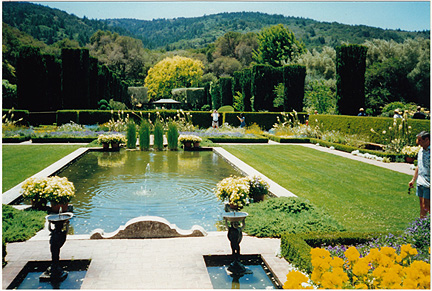Saturday, April 21, 2012, 1:00 pm
86 Cañada Road, Woodside, California
94062.
 We
are meeting a docent outside of the Visitor and Education Center.
After an approximately one-and-a-half-hour tour we will gather
at the Café at Filoli for afternoon tea/coffee. You are
encouraged to explore the blooming gardens before our tour starts.
We
are meeting a docent outside of the Visitor and Education Center.
After an approximately one-and-a-half-hour tour we will gather
at the Café at Filoli for afternoon tea/coffee. You are
encouraged to explore the blooming gardens before our tour starts.
Driving directions:
" Drive north on Highway 280.
" Take the Edgewood Road exit.
" Turn left (west) on Edgewood Road, continue until it ends
at Cañada Road.
" Turn right on Cañada Road, go 1.25 miles.
" Turn left into Filoli entrance, proceed to guardhouse.
Filoli was built for Mr. and Mrs. William Bowers Bourn, prominent
San Franciscans whose chief source of wealth was the Empire Mine,
a hard-rock gold mine in Grass Valley, California. Mr. Bourn was
also owner and president of the Spring Valley Water Company whose
property comprised Crystal Springs Lake and the surrounding lands,
areas that are now part of the San Francisco Water Department.
He selected the southern end of Crystal Springs Lake as the site
for his estate.
Mr. Bourn arrived at the unusual name Filoli by combining the
first two letters from the key words of his credo: "Fight
for a just cause. Love your fellow man. Live a good life."
Mr. Bourn chose longtime friend and prominent San Francisco architect
Willis Polk as principal designer for the house. Polk had previously
designed the Bourns' cottage in Grass Valley as well as their
home on Webster Street in San Francisco. An inventive architect,
Polk frequently combined several styles in a single building,
an eclecticism clearly evident in his design for Filoli.

Construction of Filoli began in 1915 and the Bourns moved into
the House in 1917. Bruce Porter, a talented painter, sculptor,
muralist, landscape designer, and art critic was enlisted to help
the Bourns plan the layout of the extensive formal garden that
was built between 1917 and 1929. Both Mr. and Mrs. Bourn died
in 1936.
The estate was purchased in 1937 by Mr. and Mrs. William P. Roth,
who owned the Matson Navigation Company. Under the Roths' supervision
the property was maintained and the formal garden gained worldwide
recognition. Mrs. Roth made Filoli her home until 1975 when she
donated 125 acres, which included the House and formal garden,
to the National Trust for Historic Preservation for the enjoyment
and inspiration of future generations. The remaining acreage was
given to Filoli Center.
Nestled in the woods, a beautiful conservatory-style room offers
a peaceful setting and memorable cuisine. The Café boasts
a high-quality luncheon menu, complete with some standards and
many imaginative combinations, which will reward your palate.
The menu consists of Filoli fresh seasonal salads, delicious soups
and a selection of innovative Paninis, both vegetarian and meat-based.
In addition to the house-made items, there is an array of choices
from standard favorite sandwiches and fresh side salads, sweets.